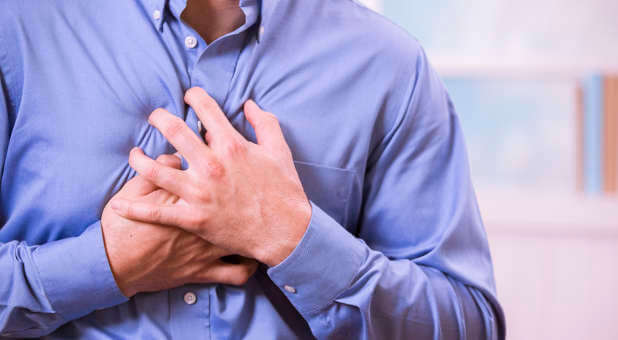In the past month, three famous people—Supreme Court Justice Antonin Scalia, Frank Sinatra Jr., and comedian Garry Shandling—have all died with shocking suddenness, even though they appeared to be healthy just hours before.
But the condition that caused their deaths—sudden cardiac arrest—is common and sometimes even predictable.
“The most common type of sudden death is sudden cardiac arrest, which is sometimes—but not always—brought on by a heart attack,” says top cardiologist Dr. Chauncey Crandall.
Sudden death is defined as dying of natural causes within an hour of onset of symptoms, if they are witnessed, and within 24 hours if the victim is alone or asleep when the event occurs in people who appear to be healthy.
The chief cause of sudden death is sudden cardiac arrest, or SCA, which is an abrupt stoppage of the heart. SCA is the leading cause of death in the U.S. and throughout the world. About 326,200 people a year experience it, and up to 90 percent die when it occurs outside of a hospital setting, according to the American Heart Association.
The deaths of Scalia, Sinatra Jr. and Shandling have all been attributed to heart attacks, but that isn’t the only cause of sudden cardiac death, says Crandall, chief of the cardiac transplant program at the Palm Beach Cardiovascular Clinic in Palm Beach Gardens.
“Everyone thinks that when someone dies suddenly, it’s due to a heart attack. Actually, it’s because the heart’s electrical system malfunctions, and suddenly becomes very irregular. While it’s true that a heart attack can do this, it’s not the only cause,” says Crandall.
“Another myth about sudden cardiac arrest is that there is nothing that could have been done to save the victim. But very often, I’ve seen people who did have warning signs, although they may not have recognized them, and research backs that up,” says Crandall, author of the Heart Health Report.
According to a recent study published in the Annals of Internal Medicine, researchers who reviewed medical records of heart patients found that about half of people who suffered from SCA actually experienced symptoms during the preceding month, but brushed them aside.
The most common symptoms were chest pain, shortness of breath, dizziness, fainting, or palpitations, a similar study of male victims of SCA found.
These are the major causes of SCA:
Heart attack: During a heart attack, a blood clot may completely block blood flow to one of the heart’s major coronary arteries. Due to a lack of blood, the heart begins to beat dangerously fast, and the bottom portion of the heart may begin to flutter or quiver in an irregular pattern (atrial fibrillation) that can stop the flow of blood to the brain. Death may quickly occur unless action is taken to restore the heartbeat. Often, people do not realize they have underlying coronary heart disease and, in one-third of cases, their first heart attack can end their life.
Faulty electrical wiring: Although a heart attack is one of the major causes of atrial fibrillation, it is not the only one. If the heart has been damaged by a previous heart attack, this can also damage the electrical system. There are also certain types of electrical abnormalities.
Hypertrophic cardiomyopathy: About one out of every 500 people has hypertrophic cardiomyopathy (HCM). HCM can occur for a number of reasons, such as high blood pressure, aging, diabetes, or sometimes thyroid disease. Sometimes it occurs for an unknown cause. When young people suffer sudden cardiac arrest, it is usually due to this condition.
Pulmonary embolism: This is the sudden blockage of one of the pulmonary arteries in the lungs, usually because of a blood clot that has formed and traveled in the bloodstream from the legs. If the blood clot is large enough, it can block blood from exiting the right side of the heart and block blood from entering the lungs. This can result in a stoppage of blood throughout the rest of the body, which can result in shock and sudden death.
Aortic aneurysm: This is the ballooning in a wall of an artery. If this occurs in the aorta, which is the main artery that supplies blood from the heart to the rest of the body, it can cause massive internal bleeding, resulting in a sudden drop in blood pressure that can cause death.
Aortic dissection: This occurs when there is a tear in the inner layer of the aorta, and blood surges through it, causing the inner and middle layers to separate. If the aorta ruptures, it can be fatal. Although a less common cause of cardiac death, an aortic dissection killed actor John Ritter in 2003.
Sudden cardiac death is often portrayed as unavoidable, but this isn’t necessarily true. Here are Crandall’s recommendations to help prevent it:
- Eat a heart-healthy diet. Research finds that even the saturated fat from a heavy meal can lead to a temporary narrowing of the coronary arteries that could bring on a fatal heart attack.
- Exercise regularly. People who are sedentary are more prone to certain life-threatening cardiovascular conditions such as pulmonary embolism.
- Get an annual physical examination. This can help pick up underlying coronary heart disease and other cardiac abnormalities.
- Know your family medical history. You’re more likely to suffer one of the conditions that cause sudden cardiac arrest if it happened in your family as well.
- Avoid infections. Viral infections, including flu, can damage the heart and make sudden cardiac arrest more likely.
- Know the warning signs of SCA. Chest pain, shortness of breath, dizziness, sweating, or “just not feeling right,” are all signs to call your doctor. If one or more come on suddenly, call 911.
For the original article, visit newsmaxhealth.com.














































